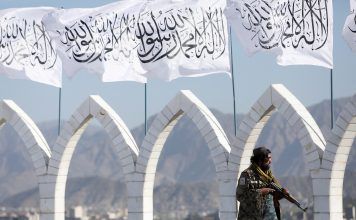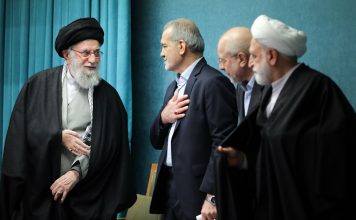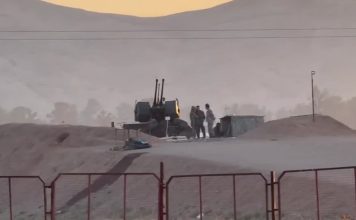
By Natasha Phillips
Human rights organisation Amnesty International said it had “mounting evidence” that Iran’s government had engaged in hostage taking through its detention of Iranian-Swedish researcher Ahmadreza Djalali. Amnesty International made the comment in a May 19 press release.
“There is mounting evidence to indicate that Iranian authorities are committing the crime of hostage taking against Ahmadreza Djalali, a Swedish-Iranian academic who is at risk of imminent execution in Tehran’s Evin prison,” the statement said.
“The Iranian authorities are using Ahmadreza Djalali’s life as a pawn in a cruel political game, escalating their threats to execute him in retaliation for their demands going unmet,” Diana Eltahawy, Amnesty’s deputy director for the Middle East and North Africa, added.
Demonstrations organized by Amnesty took place on May 17 in London and Brussels urging Iran’s government to halt the execution of Iranian-Swedish academic Ahmadreza Djalali. Protests in support of the researcher have also taken place in several other countries around the world, including Sweden, where Djalali is a citizen.
Anche a Bruxelles si manifesta per Ahmadreza Djalali, il ricercatore che potrebbe essere messo a morte in #Iran da un momento all'altro.#SaveAhmadreza https://t.co/7OHtiJFyqE
— Amnesty Italia (@amnestyitalia) May 18, 2022
NO MORE EXECUTIONS IN IRAN!
If you are in London today, join our protest at 5pm in front of the Iranian embassy, 16 Princes Gate, SW7 1PT, to send a strong message to the authorities in Iran to halt the execution of Ahmadreza Djalali and release him. https://t.co/aKdhNC5Tk6
— Amnesty Iran (@AmnestyIran) May 17, 2022
Demonstration today at Stockholm, Ahmadreza’s 10 year old son held up a sign saying “free my dad!” pic.twitter.com/1VKFSmu29C
— Freedom for Dr. Ahmadreza Djalali (@Free_Djalali) May 14, 2022
Iran’s foreign ministry said Djalali could be executed by May 21 after being found guilty in 2017 of spying for the Israeli government. Djalali has consistently denied the charges.
The announcement of the execution was made during a press briefing on May 5, the same day that a final hearing for former Iranian official Hamid Nouri — who is on trial in Sweden for alleged war crimes — took place. Tehran has called the trial illegal and politically motivated, and the claims against Nouri baseless.
Iran’s Foreign Ministry spokesperson Saeed Khatibzadeh told reporters that Djalali’s lawyers had asked for a review of the sentence and said the judiciary was considering the application. The UN, the US and the EU have called for Djalali’s immediate release.
Meanwhile French nationals Cecile Kohler and her partner Jacques Paris — who are both members of France’s National Federation of Education — were arrested on May 7 in Tehran. Iran’s government said the couple were spies who had fomented “insecurity” in the country. The arrests come at a time of heightened tension between Iran and the EU as negotiations in Vienna for the 2015 nuclear deal remain deadlocked.
U.S. State Dept Calls on Iran to Release Two Detained French Nationals
Several foreign nationals are currently detained in Iran.
Jamshid Sharmahd — a German-Iranian journalist and software engineer at risk of execution — was arrested by Iranian officials in Dubai in 2020 and brought to Iran. Sharmahd was charged with espionage, and accused of being involved in a 2008 attack on a mosque in Shiraz which killed 14 people and injured 200 others. His family have always denied the allegations.
“[My father] was tortured, has no lawyer, no phone rights, no medical care. His body is breaking down severely under these inhumane conditions including 640 days of solitary confinement,” his daughter Gazelle Sharmahd told Kayhan Life. “He has lost 40 pounds, almost all his teeth, and he is 67 years old and suffers from advanced stage Parkinson’s disease. How much longer can he endure such horrific conditions?”
Dear friends, I need your help to share this clip for a week on any channel. Maybe with your help we can save my father's life. Your signature can save him before he, like Dr. Jalali, is sentenced to death as well: #جمشید_شارمهد #SaveSharmahd https://t.co/cZEfEi88GL pic.twitter.com/HDoBxytPip
— Gazelle (@GazelleSharmahd) May 17, 2022
Dear Friends! My father's life is in danger! Please do not let the same thing that happened to the Ruhollah Zam happen him! Support our Twitter Storm Saturday 8pm Tehran time pic.twitter.com/TnGbLzyUlM
— Gazelle (@GazelleSharmahd) March 5, 2022
In its annual report for 2021, Amnesty International held that Sharmahd remained at risk of the death penalty, with journalists at heightened risk of execution. Iran is the third worst country for press freedom, ranking 178 out of 180 states, according to the Reporters Without Borders World Press Freedom Index. At least 1,000 journalists and citizen-journalists have been arrested, detained, killed, disappeared or executed by Iran’s regime since 1979.
“The situation in Iran is getting critical, which is dangerous for the people in Iran who are under brutal pressure, but also for us, since the regime has used executions of political prisoners in the past as a scare tactic to intimidate activists. With Djalali on death row and my father awaiting the death sentence, we are terrified that they will sacrifice them to stem demonstrations and send a message to the European countries,” Ms. Sharmahd said.
Meanwhile, Iran is undergoing another wave of nationwide anti-government protests. Citizens are taking to the streets as food prices soar and Iran’s economic crisis worsens.
Morad Tahbaz — an Iranian-American conservationist born in England — was sentenced to 10 years in prison in November 2019 for “contacts with the US enemy government.” As part of a deal to release the formerly detained dual nationals Nazanin Zaghari-Ratcliffe and Anoosheh Ashoori in March 2022, Tahbaz was to be given indefinite furlough. Tahbaz was initially released but returned to prison two days later.
Speaking on May 17 to the Foreign Affairs Committee inquiry set up to investigate Iran’s hostage-taking practices, former British Foreign Secretary Jeremy Hunt said global cooperation was needed to stop states from arbitrarily detaining individuals. Hunt tried to secure Zaghari-Ratcliffe’s release as foreign secretary between 2018 and 2019.
During the evidence session, Hunt criticized the British government’s attempts to secure the release of its detained dual nationals in Iran. “Even though we are all delighted that Nazanin and Anoosheh are home, I don’t think the British state can look on the totality of what happened with any pride at all,” Hunt said.
The former minister said Iran’s practices amounted to hostage diplomacy and that the Foreign Office had allowed a historic $522 million debt owed to Iran to “fester.”
ANALYSIS: How Hostage Taking Is An Integral Part of Iran’s Foreign Policy







